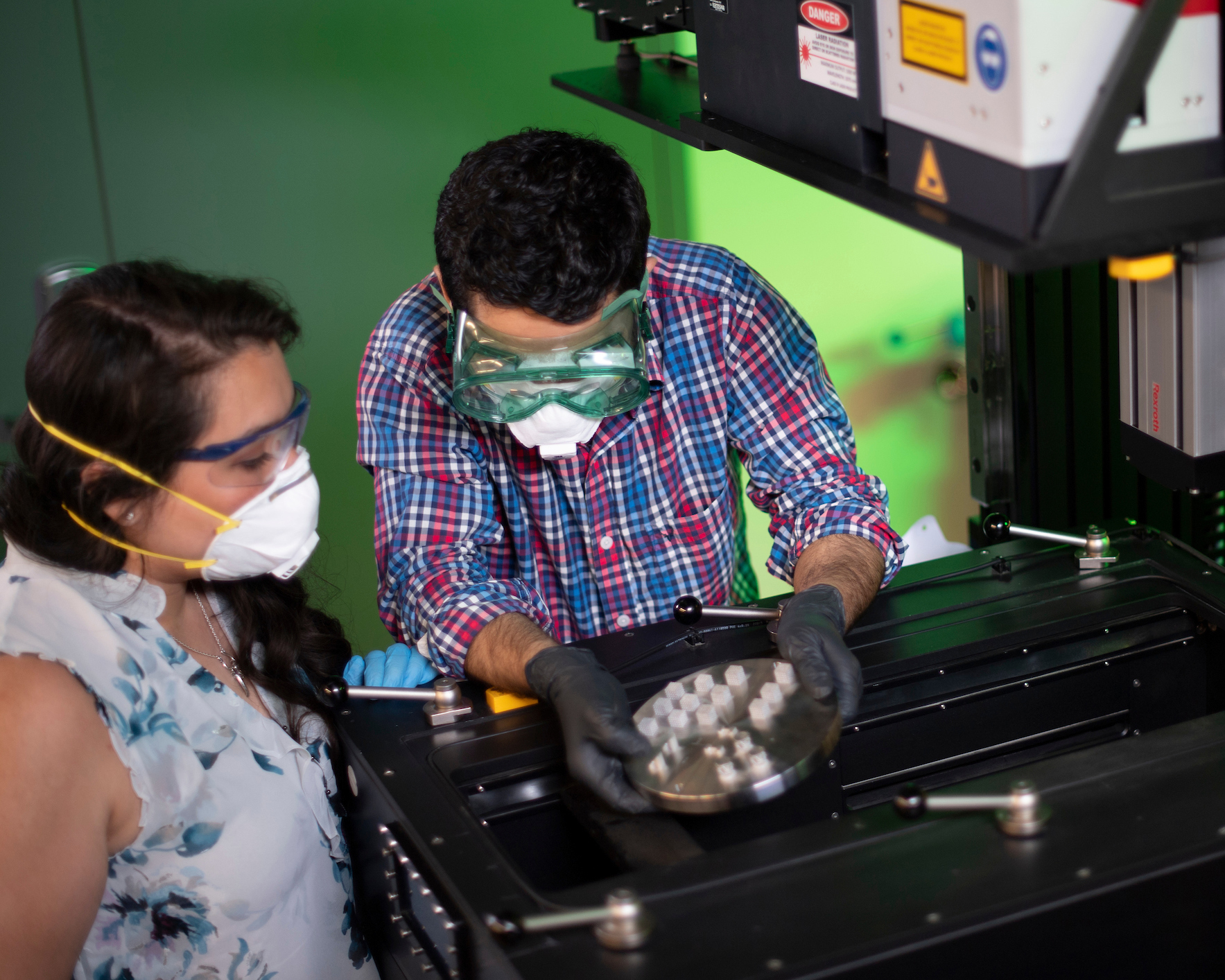DENTON (UNT), Texas — The University of North Texas Center for Agile and Adaptive Additive Manufacturing (CAAAM) is transforming manufacturing technologies to create market-based solutions involving fundamental science impacting everything from medical implants to next-generation drones and encouraging new industry and global collaborations for North Texas, ensuring a workforce of engineers trained to lead in this disruptive new technology space.
The center was launched in 2019 with a $10 million appropriation by the Texas State Legislature, which recently renewed funding through 2023 with an additional $10 million, reaffirming the importance of CAAAM in positioning Texas as a leader in additive manufacturing innovation and workforce development.
CAAAM has grown to include a brand-new manufacturing facility of nearly 2,500 square feet, along with the renovation of more than 5,000 square feet of lab space. The center invested nearly $2.21 million in state-of-the-art equipment, establishing it as the nation’s premier research and development and educational center for additive manufacturing. Multiple new positions have been filled to meet the center’s growing research needs.
More than 25 faculty and researchers and more than 20 graduate and undergraduate students from engineering, science, business and information science are currently conducting interdisciplinary research in the facilities. CAAAM faculty members have been awarded nearly $2.4 million in externally funded research grants from agencies such as the National Science Foundation, the U.S. Department of Energy, the U.S. Department of Defense, the U.S. Army Research Laboratory and the Air Force Office of Scientific Research and have applied for research proposals totaling nearly $17.5 million.
“Through support from partnerships and the state of Texas, CAAAM is positioned to build and support next-generation manufacturing to lead U.S. global competitiveness,” said Narendra Dahotre, associate vice president of CAAAM. “We are poised to pave the way forward for the future of manufacturing innovation’s success and to address acute shortages in the manufacturing workforce.”
To bolster a skilled and diverse workforce for additive manufacturing in Texas, a new Institute for Transformational Education and Additive Manufacturing (ITEAM), an educational wing of CAAAM has been established in a state-of-the-art educational and instructional laboratory for undergraduate and graduate students. ITEAM offers an interdisciplinary additive manufacturing education integrating five critical areas: materials science and engineering, mechanical engineering and design, cybersecurity, supply chain logistics and data/decision sciences. This type of integrated research is unique to CAAAM-UNT and not offered at other national and international centers. Additionally, ITEAM is collaborating with regional and multinational industry and Texas community colleges to create certificate programs offering continuing education for regional and defense industry personnel.
“Our faculty and students continue to push the boundaries of additive manufacturing and elevate UNT’s status as a Tier One research university,” Dahotre said. “Our success is a testament to the innovative research and industry collaboration CAAAM provides.”
CAAAM research successes of note include:
- Researchers participate in a $1.5 million DOE grant to innovate 3D printed materials for cars — Wonbong Choi, a professor in UNT’s Department of Materials Science and Engineering and Department of Mechanical Engineering, and Yijie Jiang, an assistant professor in UNT’s Department of Mechanical Engineering, will collaborate with the Center for Nanophase Materials Sciences at Oak Ridge National Laboratory, the largest U.S. Department of Energy science and energy laboratory, as part of a $1.5 million grant from the Department of Energy to fabricate a lightweight, 3D-printed carbon fiber composite material equipped with embedded sensors for use in car structures.
As principal investigators, Choi and Jiang will design and fabricate embedded sensors by 3D printing and evaluate their functionality in a carbon composite. These flexible microsensors will be located precisely during 3D printing and will deliver real-time performance data during the material’s testing phase. Once the material is successfully tested and installed in cars, embedded sensor technology will provide dashboard data for car owners. - Researchers Tackling the Future of UAVs with Self-powered Wireless Sensors — Wonbong Choi, a professor in UNT’s Department of Materials Science and Engineering and the Department of Mechanical Engineering, and Ifana Mahbub, an assistant professor in UNT’s Department of Electrical Engineering, are working to make drones last longer in flight with little required maintenance in between. The researchers have received a $211,786 grant from the Department of Defense to develop a suite of self-powered wireless sensors and wireless interfaces for unmanned aerial vehicles (UAVs). The sensors will be used to detect the stress and strain of UAVs and could be used to monitor radioactivity in a contaminated area. A new mask aligner, a machine with high alignment accuracy and sophisticated exposure optics, will be used to develop the self-powered sensors with nano-antenna structures for wireless communication.
- UNT researchers receive million-dollar DOD grant to study fundamental bonding in metallic alloys — Principal investigator Srinivasan Srivilliputhur, a professor in UNT’s Department of Materials Science and Engineering, and co-PIs Rajarshi Banerjee, a Presidential and Regents Professor, and University Distinguished Research Professor Michael Baskes, a member of the U.S. National Academy of Engineering, are working to better understand how metal alloys function at the atomic level with a $1 million grant from the Department of Defense, under the U.S. Air Force Office of Scientific Research. The team hopes to give scientists better insight on how certain metal alloys used by the military and aerospace industries deform under stress.
- Professor Haifeng Zhang part of new DOE grant to create sensor for additive manufacturing process — Haifeng Zhang, a professor in UNT’s Department of Mechanical Engineering, is a co-principal investigator for a $1 million grant from the U.S. Department of Energy. Zhang, along with researchers at Penn State University, will develop and fabricate an in-situ sensor that will be used to assess the quality of the part and material properties of a microstructure during the additive manufacturing process. By detecting a possible defect earlier in the process, the manufacturing parameters could be revised sooner, saving time and money. The new sensor also will improve performance.





